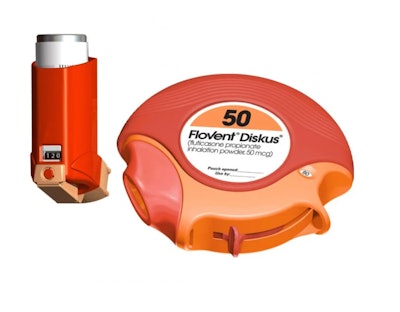
It has been four months since drug manufacturer GlaxoSmithKline discontinued production of its longtime asthma inhalers, Flovent HFA and Flovent Diskus. According to the Asthma and Allergy Foundation of America (AAFA), physicians must consider prescribing alternative medications or generic substitutions to avoid disrupting patients’ asthma maintenance therapy.
Flovent is an inhaled corticosteroid that contains fluticasone propionate. Fortunately, generic versions of Flovent HFA, a metered-dose inhaler, and Flovent Diskus, a dry powder inhaler, are available. Generic versions are equally as effective as Flovent when comparing dosage and quality.
Barriers to using generic versions, including insurance, cost and availability, may force physicians to look at alternative asthma medicines. Two, branded alternatives — ArmonAir Digihaler and Arnuity Ellipta — also contain fluticasone propionate. ArmonAir Digihaler has different dosing instructions while Arnuity Ellipta offers similar success, but is not a substitute for Flovent. A third alternative, QVAR Redihaler, is a different type of corticosteroid.
Some alternative asthma maintenance medications may not be appropriate for young children. Dry powder inhalers, for example, require the use of breath-actuated pumps. This requires deep breathing and holding the breath, which may be difficult for young children. Other nebulized corticosteroid alternatives may require more frequent dosing for as long as 10 to 15 minutes each time — another difficult challenge for young children. According to physicians, Asmanex may be an effective fluticasone inhaler alternative for younger children.
When changing prescriptions, physicians must remind patients to check directions for use and carefully follow dosing instructions. For example, patients who switch to a dry powder inhaler will likely need to use a spacer.
If an authorized generic is not covered by insurance, AAFA suggests asking for a “formulary exception,” or an appeal, to determine if the insurance company will provide an exemption and cover the medicine.























